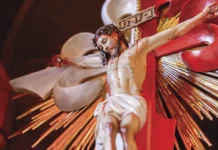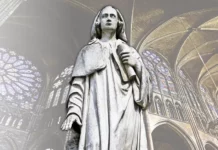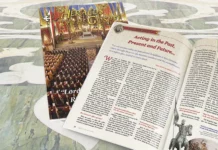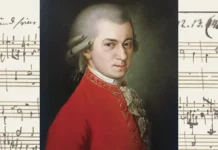Enlisting as a volunteer in the fight against communism, Captain Teodoro Palacios departed for Russia. There, an eleven-year heroic ordeal awaited him and his companions, in the Soviet concentration camps.
A mid the mysterious and profound reflections of the Book of Psalms, we come upon a question that we Catholics could well make our own in the face of the storms that currently assail the flock of the Lord’s anointed (cf. 1 Jn 2:27), the Holy Catholic Church: “Why do the nations conspire, and the peoples plot in vain? The kings of the earth set themselves, and the rulers take counsel together, against the Lord and His anointed” (Ps 2:1-2).
Indeed, persecution is a common reality for the Church of Christ since its beginnings. And the Divine Lamb has prepared her for this in various ways. He declared that whoever abandoned everything for the sake of the Kingdom of Heaven would receive a hundredfold even on this earth, with persecutions (cf. Mk 10:29-30), and He warned those who wished to be His disciples: “I send you out as sheep in the midst of wolves; […] Beware of men; for they will deliver you up to councils, and flog you in their synagogues […] you will be hated by all for my name’s sake. But he who endures to the end will be saved” (Mt 10:16-17, 22). And as if this were not enough, He also declared blessed those who are persecuted for the sake of righteousness (cf. Mt 5:10).
Ever since the decree of enmity promulgated by God between the race of the Virgin and the race of the Serpent (cf. Gn 3:15), the wicked have not ceased to make war on the children of light; and they will not cease until the end of time. For this reason, each one of us has the mission to advance courageously on the battlefield of life, bearing, in the footsteps of the Redeemer, not peace but the sword (cf. Mt 10:34)!
Many upright souls over the course of history have given us an example of this virtuous disposition of spirit, even in a past less distant than we might imagine… Among them is a Spanish military captain whose valiant struggles in favour of his Faith and his homeland we shall consider in these pages.1
Genuine desire to fight for the Church

On September 11, 1912, in Potes, Cantabria, a boy named Teodoro Palacios Cueto was born, the son of a modest farmer. His mother died when he was only six years old.
Despite the family’s humble circumstances, his father, an honourable man with high standards, spared neither effort nor expense in educating his nine children. Teodoro studied with the Jesuits in Zaragoza, then as a boarding student in Villacarriedo; finally, he travelled to Madrid to study medicine.
But before finishing his studies, overtaken by the religious persecution that exploded in Spain at the beginning of the Civil War, he decided to join the Catholic troops in defence of the ideals he had always loved. By the end of the conflict, having proved his worth, the former medical student had risen to the rank of captain.
However, his heart yearned to continue the battle against communism.
In Soviet lands

Joining the ranks of the Spanish Volunteer Division during the Second World War, Captain Palacios departed for the Russian city of Kolpino, under the orders of Commander José Alcina Payeras, in order to attack the Soviets.
After several military engagements, at dawn on February 10, 1943, the 2nd Battalion of the 262 Regiment began the last armed battle it would face in that territory. For long hours the Spaniards resisted heroically in their trenches, “fighting with their hands and praying to God in their hearts” (2 Mac 15:27), under the incessant fire of the communists and the incapacitating cold. Little by little, however, they were being devastated by enemy bullets…
Teodoro Palacios saw almost all the officers and a frightening number of soldiers perish at his side. Nevertheless, he was determined to fight with his men to the death, and in fact he would have done so, if their ammunition had not completely run out.
At dusk, empty-handed and surrounded on all sides by Russians, the thirty-five Spanish survivors, twenty-one of whom were badly wounded, were taken prisoner and thus began their harrowing eleven-year ordeal in the gulags of the Soviet Union, the “infinite prison”.2
Honour in face of the enemy!
After some interrogations and nights spent in the prison right there in Kolpino, the Spaniards were transferred to Leningrad, in the first of a series of moves that would take them across the immense expanses of Russia. Together with many of their compatriots from other battalions who had also been taken prisoner on February 10, they formed a group of approximately 250 soldiers.
When they arrived at their destination, a new interrogation began. Questioning them about their religion and the motives for their presence in Russia, the communists, like ferocious dogs, aimed at making the weakest desist by using terror while, at the same time, “sniffing out” those with the strongest convictions in order to persecute and torment them with greater cruelty. This was the case with Captain Palacios.

This valiant warrior was grieved to see many of his soldiers, shaken by pressure and fear, deny the Catholic Faith and the just ideals they had defended… About these, he later lamented: “It was the eternal Spanish song. The brave man, who knows how to die for an ideal and yet does not know how to live defending it. […] ‘He who overcame the sword, was overcome by politics,’ goes the refrain. Some soldiers became so confused that they made even their captors smile”…3
Taken with zeal in the face of this crucial situation and aware that the firmness of his soldiers depended on his good example, Captain Palacios stepped forward for questioning, followed by three other officers.
“Your religion?” asked the head of the camp.
“Roman Catholic and Apostolic.”
“What were your reasons for entering Russia?”
“To fight against communism.”
“Dismissed,” replied the Soviet commissar, stunned.
His pride transmitted new courage to the soldiers, who, one after another, began to intrepidly declare that which a short time before they had denied out of cowardice. However, at the same time, his courageous and unshakeable personality took shape in the eyes of his adversaries. Until the end of the captivity, and in a steadily increasing manner, Teodoro Palacios would be one of the main targets of the hatred of those enemies of the Faith.
Inhumane conditions and union among the good
Temperatures of forty degrees below zero, twelve hours a day of forced labour, meagre rations – a piece of bread, potato peelings or a little thin soup –, psychological pressure from the camp leaders to make them prevaricate in exchange for an extra portion of food or other “benefits”, various illnesses: this was the dreadful scourge imposed on those who wished to remain firm in the defence of their Faith and their homeland.

In the midst of all these horrors, the good found strength and encouragement in mutual support and, above all, in the confidence they had in their captain. The soldiers’ veneration and even “filial” sentiments for him were quickly consolidated. A case involving the soldier José Jiménz is a good example of this relationship. He had five younger brothers who had been arbitrarily taken to Russia during the Spanish Civil War. At a certain moment, when he was summoned to renounce the Catholic Faith and his Spanish nationality, the head of the camp said, in the hope of convincing him:
“Out of gratitude to the Soviet Union, which feeds your five brothers, sign this document.”
Jiménez refused to do so and, with a choked voice, replied:
“I have no family other than my mother in Spain; and, in Russia, my captain.”
Now, the beneficial union of all of them with their “capitán” drew the attention of the Russians, who sought to separate the soldiers from his influence, for they saw this as the only way to make them yield…
“Your captain conducted himself as a captain!”

The admirable patience and perseverance of Teodoro Palacios became a source of enthusiasm not only for the Spaniards but also for the other prisoners, whether German, Italian, Portuguese, French or of other nationalities. Indeed, in the midst of so many soldiers and even officers who had lacked the firmness to be true to their ideals, the soul of this faithful captain shone like the sun! There, he won the respect and admiration of many.
On one occasion, while two soldiers, one of whom was Spanish, were conversing, a general, a compatriot of the other soldier, passed by them, “not one of the pure ones, who had retained all his honour, but one of those who had voluntarily degraded himself.”4
The second soldier remained seated and carried on the conversation without a pause. Shortly afterwards, however, when Captain Palacios passed, he immediately arose and saluted. Surprised, his companion asked him why he was saluting a foreign captain and not his own general, to which he replied: “Because your captain conducted himself as a captain and my general did not conduct himself as a general.”
It is, in fact, undeniable that as regards authority, integrity must be perfect, and whoever fails in this deserves neither God’s blessing nor the confidence of subordinates.
The reward of fidelity

During the long and painful years spent in the “Russian hell”, Teodoro Palacios never allowed the slightest stain to mar his fidelity, and he fought hard for his soldiers in order to remove from them any temptation to commit treason. He encouraged them by reminding them of their homeland and kindled in them a burning desire to win the true freedom that belongs to the children of God! Freedom which communism could never provide, with its biased tribunals, false witnesses, unfounded accusations, violation of every right and endless torture.
In March 1954, God finally granted them the fulfilment of their hopes. On a seemingly ordinary day for those half-dead prisoners, a hospital wagon was brought to them for a repatriation transfer. They thought it was just another false promise, like so many others, and they embarked without any interest, prostrate and weak. When they arrived at their destination, the Port of Odessa, they saw the unimaginable: a large Red Cross ship that had come to rescue them!
The words of Captain Palacios well express his emotion: “I placed my arms on the shoulders of the closest soldiers, for my legs began to tremble and I could no longer stand. Around me several soldiers, very pale, were crying. I have never seen beings paler than those. They looked like dead men standing upright. There were no cries, no embraces. They wept silently, meekly, unable to utter a word.”5 The reward had come for the tested and triumphant fidelity which, in the face of evil, had never flinched, never given in and never stopped fighting!
What position will we take?
To believe in the light during the day is superfluous; to do so in the middle of the dark night of trials, which seem eternal, presupposes unparalleled heroism. Similarly, to remain faithful to the Church during periods of peace and prosperity is only a duty; to persevere in her defence during storms requires an authentic love, which attracts divine benevolence.
This loving care of Providence was, without doubt, what sustained Teodoro Palacios as he faced the communist fury, and it will be what will sustain the true children of God until the end of the world.
In our present days, riddled with both open and veiled persecutions of the Catholic Faith and its immutable morality, what position will we take? Will we enlist in the army of Holy Church to fight for her until the end, or will we sell our souls to mediocre relativism and compromise with the maxims of the world?
Whatever happens, let us never lose this conviction: let the wicked do what they may, let them persecute the truth as much as they can; their defeat has already been decreed by the merits of the Redeemer’s Most Precious Blood, and it will surely come on the day when they least expect it! ◊
Notes
1 For this purpose, the work primarily used as a reference is: LUCA DE TENA, Torcuato. Embajador en el infierno. Memorias del Capitán Palacios. Madrid: Homo Legens, 2010.
2 Idem, p.10.
3 Idem, p.22.
4 Idem, p.74.
5 Idem, p.254.







